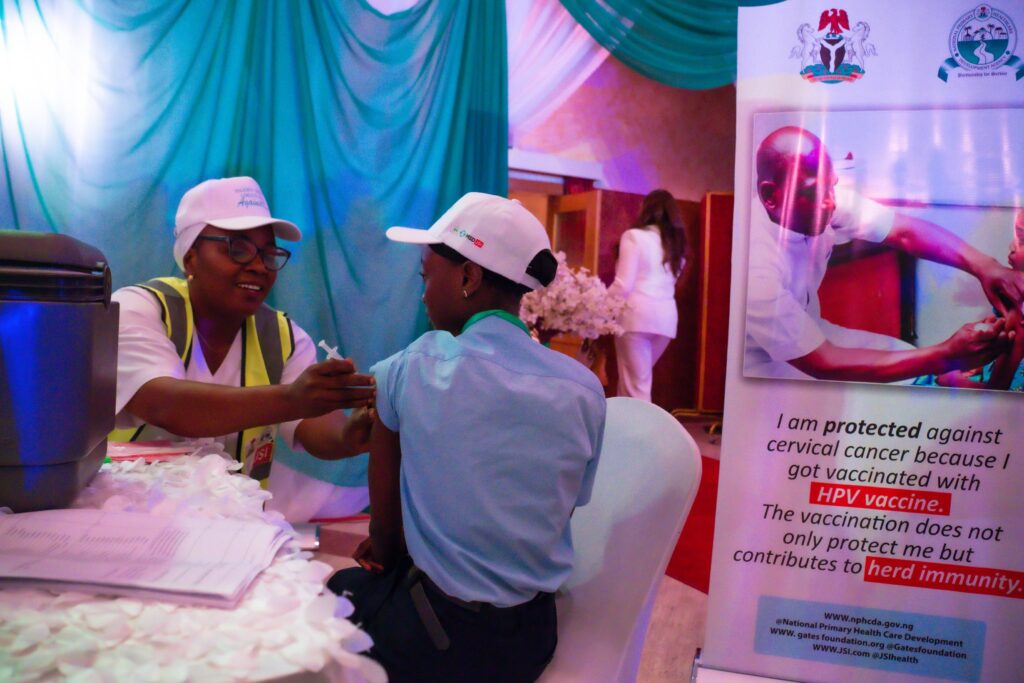Today, Nigeria incorporated the human papillomavirus (HPV) vaccine into its standard immunization program, with the goal of reaching 7.7 million girls.
This represents the largest single-round HPV vaccination effort in the African region.
The primary aim is to immunize girls against the virus responsible for nearly all cases of cervical cancer. Girls between the ages of 9 and 14 will, therefore, receive a single dose of the vaccine, which has demonstrated high effectiveness in preventing infection with HPV types 16 and 18, known to cause at least 70% of cervical cancers.
Nairametrics learns that in line with WHO guidelines, the inclusion of HPV vaccination in national immunization programs is recommended for countries where cervical cancer is a significant public health concern and where its cost-effective and sustainable implementation is achievable.
Therefore, Nigeria has made it a priority to incorporate the vaccine into the nation’s routine immunization schedule.
What the Health Minister is saying
Muhammad Ali Pate, the Coordinating Minister of Health & Social Welfare, keen on ensuring the reduction of Cervical cancer cases remarked,
- “The loss of about 8000 Nigerian women yearly from a disease that is preventable is completely unacceptable.
- “Cervical cancer is mostly caused by HPV, and parents can avoid physical and financial pain by protecting their children with a single dose of the vaccine.
- “Saving lives producing quality health outcomes and protecting the wellbeing of Nigerians are central to the Renewed Health Agenda of President Bola Ahmed Tinubu”.
Speaking further on the necessity if the vaccination, he said,
- “The onset of the vaccination campaign is an opportunity to safeguard our girls from the scourge of cervical cancers many years into the future. As a parent myself, I have four daughters, all of them have had the same HPV vaccine to protect them against cervical cancer”.
- “I’d like to implore fellow parents to dutifully ensure that this generation of our girls disrupt the preventable loss of lives to cervical cancer in addition to other untold hardship, loss, and pain.”
Vaccination roll-out
During the initial rollout in 16 states and the Federal Capital Territory, a comprehensive five-day mass vaccination campaign will be conducted in schools and communities.
Following this, the vaccine will be integrated into the regular immunization schedules provided within health facilities.
The second phase of vaccination introduction is scheduled to commence in May 2024 and will encompass 21 states.
It’s important to note that the vaccine is being supplied at no cost, made available through the Federal Ministry of Health in collaboration with the National Primary Health Care Development Agency.
This initiative is supported by organizations like Gavi, the Vaccine Alliance, the United Nations Children’s Fund (UNICEF), the World Health Organization (WHO), and various other partners.
In preparation for the campaign and subsequent vaccine distribution across health facilities, more than 35,000 health workers have been trained, with the support of the WHO country office in Nigeria and other partners.
To ensure broad access, vaccination sites have been established in all 4,163 wards across the 16 states included in the initial rollout.
Additionally, mobile vaccination units have been set up to ensure that even remote communities can access the vaccine.
Background
In Nigeria, cervical cancer ranks as the third most prevalent cancer and stands as the second leading cause of cancer-related fatalities among women aged 15 to 44 years.
In the year 2020, which is the most recent year for which data is available, the country reported 12,000 new cases of cervical cancer, resulting in 8,000 deaths.
The pressing demand for vaccines to combat this alarming situation has been exacerbated by global supply shortages.
Nevertheless, these supply challenges are gradually improving, thanks to sustained market development efforts aimed at strengthening the HPV vaccine market and the recommendation for a single vaccine dose.
Recognizing the pivotal opportunity to reach a larger number of girls with enhanced global HPV vaccine supply and the renewed impetus to expedite cervical cancer prevention, the Gavi board approved a comprehensive revitalization of its HPV vaccine program. This includes an investment exceeding US$ 600 million by the end of 2025.
With this additional funding, Gavi, in collaboration with its partners, has set an ambitious objective of reaching over 86 million girls by 2025, with the aim of averting more than 1.4 million future deaths attributed to cervical cancer.
